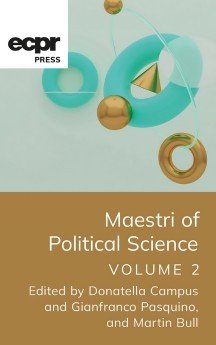Maestri of Political Science: Volume II
About this ebook
Its basis is the belief that the future development and sophistication of the discipline will benefit from a critical understanding of the works of early political “giants” whose contributions are presented and analysed: Gabriel A. Almond, Raymond Aron, Philip Converse, Maurice Duverger, Stanley Hoffmann, Paul Lazarsfeld, Arend Lijphart, Elinor Ostrom, William H. Riker, Stein Rokkan and Susan Strange.
The editors review and consider the contributions of these maestri to the study of contemporary democracy, political culture, electoral systems, political communication, the transformation of capitalism and state formation in Europe. Maestri of Political Science is aimed not only at a new generation of political scientists but is a valuable opportunity for established scholars to see new light through old windows.
About the author
Donatella Campus is Associate Professor of Political Science at the University of Bologna. She is the author of L'elettore pigro. Informazione politica e scelte di voto (Mulino, 2000); L'antipolitica al governo (Mulino, 2006); Comunicazione Politica: Le nuove Frontiere (2008).
Gianfranco Pasquino is Professor Emeritus of Political Science at the University of Bologna and Senior Adjunct Professor at the Bologna Center of the Johns Hopkins University. Fellow of the Accademia dei Lincei, his most recent books are Italian Democracy. How It Works (Routledge 2020), Libertà inutile. Profilo ideologico dell’Italia repubblicana (UTET 2021), Tra scienza e politica. Una autobiografia (UTET 2022) and Il lavoro intellettuale (UTET 2023). He has co-edited The Oxford Handbookeonardi of Italian Politics (Oxford University Press 2015) and the Dizionario di Politica (UTET-De Agostini 2016, 4a ed., revised) and co-authored (with Riccardo Pelizzo), The Culture of Accuntability. A Democratic Virtue (Routledge 2022).
Martin Bull is Professor of Politics and Associate Dean for Research & Innovation at the University of Salford. Former Director of the European Consortium of Political Research (2013-201) he is a specialist of Italian and comparative politics. His most recent work includes: ‘The Italian Communist Party in the 1980s and the Denouement of the Party System’, Journal of Modern Italian Studies, No. 2, 2023; ‘The Italian Government Response to Covid-19 and the Making of a Prime Minister’, Contemporary Italian Politics, Vol. 13, No. 2, 2021; and ‘The Radical Left since 1989: Decline, Transformation and Revival’, in Eleni Braat and Pepijn Corduwener (eds), 1989 and the West: Western Europe since the End of the Cold War (London: Routledge, 2020). He was Editor-in-Chief of the Italian Political Science Review (2019-2022) and currently Editor-in-Chief of the Journal of Contemporary European Studies and Founding Editor of the ECPR’s political science blogsite, The Loop.




